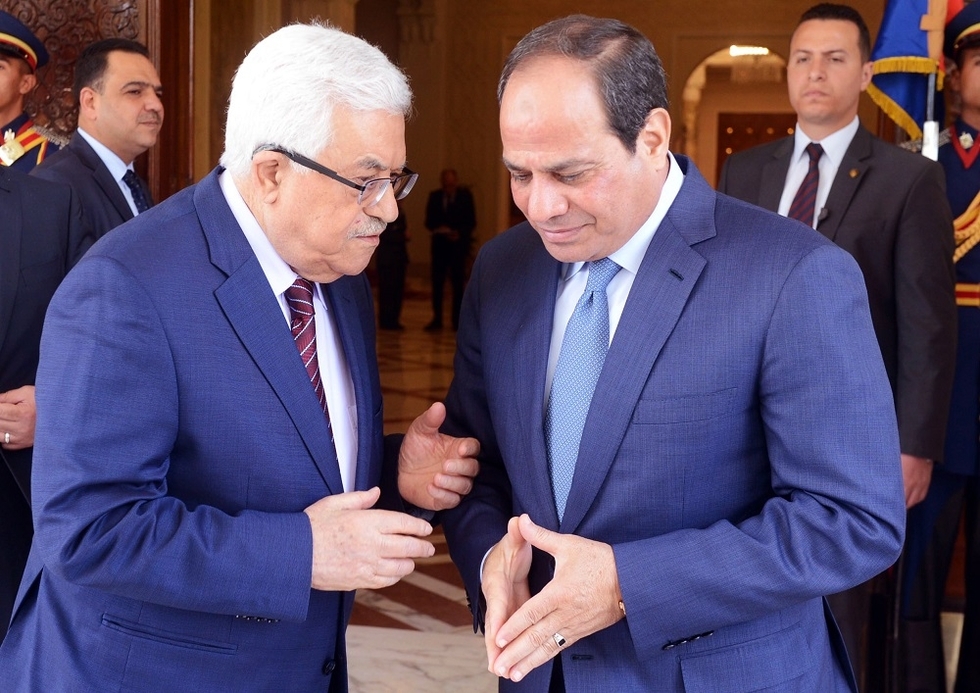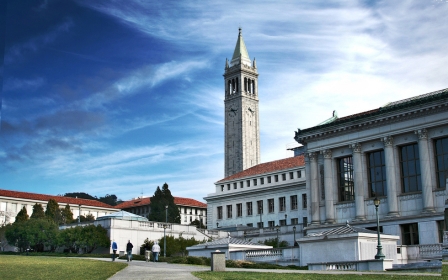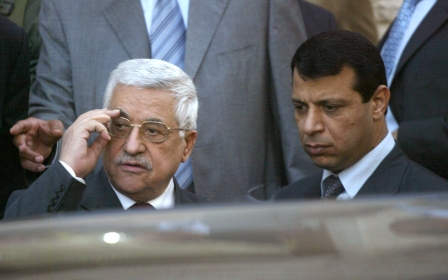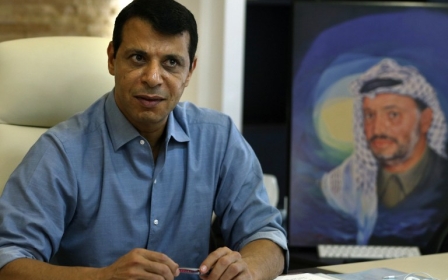Abbas cracks down on leaks, adviser leaks crackdown to MEE

Mahmoud Abbas instructed his aides and advisers to keep quiet about leaked phone conversation between a high-ranking Egyptian intelligence officer and exiled Palestinian strongman Mohammed Dahlan mocking Abbas, sources close to the issue have said.
According to an adviser who spoke to Middle East Eye on the condition of anonymity, the Palestinian president on Monday told those close to him to stop speaking to the press on the matter, a request that was quickly rejected.
“The president wants this story to die quickly and he said let's overcome it with the least consequences," the adviser said, adding the president wanted to protect his ties with Egypt, “the biggest and most influential Arab country”.
However, several aides close to Abbas have told MEE of growing tensions about the alleged special treatment Dahlan receives in Cairo and the Egyptian government’s reported attempts to bring him back to the political arena.
“President Abbas knows the leaks are true but he is not willing to lose Egypt,” the aide said.
Safty heads up the GID’s Palestinian portfolio, while Dahlan used to be Fatah's main man in Gaza before launching a failed attempt in late 2006 to remove Hamas.
He was then forced to flee to the West Bank, but by 2010 he was accused of trying to overthorw Abbas. In 2011, Fatah revoked his membership and Dahlan was forced into exile once again, allowing him to build up ties with supporters in the Gulf and Egypt.
On the surface, Abbas and his Egyptian counterpart, Abdel Fattah al-Sisi, are said to have a warm relationship. Officials insist a recent meeting at the UN in New York was cordial, despite allegations that Egypt was trying to interfere in Palestinian affairs.
Following the meeting, Egypt's foreign minister, Sameh Shokri, strongly denied allegations that Egypt was attempting to meddle in Palestinian affairs, according to Ramallah news.
Shokri said that Egypt had no intention of imposing a specific vision on the Palestinian Authority or the Palestinian people, although he added that Egypt always encouraged solidarity between the PA and the population, as well as within the two leading Palestinian factions of Fatah, which governs the West Bank, and Hamas, which rules Gaza.
“The meeting between president Abbas and president (Sisi in New York) was very warm and there is a complete understanding between the two leaders over the very detailed issues” Shokri told the newspaper.
However, earlier this year, senior Palestinian and Jordanian sources told MEE that a plan launched jointly by Egypt, Jordan and the UAE aimed to install Dahlan as PA president in a post-Abbas era.
Abbas is said to have agreed to bring back Dahlan's people, but said bringing Dahlan himself would be difficult because of the legal charges that have been levied against him in the West Bank, including a 2014 convicting in absentia for defaming the state. In 2015, a corruption case linking him to the alleged misuse of $17m in expenses was dismissed. Dahlan has always insisted the charges were politically motivated.
“The message was clear to the Arab Quartet: Dahlan has no chance of coming back,” an aide to Abbas previously said about the attempts.
On Monday, Palestinian officials also highlighted what they described as a positive meeting between Abbas and Sisi, while downplaying the leaks, saying that Palestine was not a state that followed such allegations about “small things”.
A number of Fatah activists lashed out on social media after the leaks.
Muner Jaghoub, a party loyalist, accused the Egyptian intelligence chief of being “part of the conspiracy” against Abbas.
“This places him [Safti] in the front that stands against the Palestinian national project,” he said.
Other political factions in Palestine have shied away from the controversy.
Rabah Muhanna, who heads up the Popular Front for the Liberation of Palestine (PFLP) in Gaza said: “Our relationship with the Egyptian intelligence chief is wonderful and he always expressed his respect for PFLP and its positions.”
This article is available in French on Middle East Eye French edition.
Middle East Eye propose une couverture et une analyse indépendantes et incomparables du Moyen-Orient, de l’Afrique du Nord et d’autres régions du monde. Pour en savoir plus sur la reprise de ce contenu et les frais qui s’appliquent, veuillez remplir ce formulaire [en anglais]. Pour en savoir plus sur MEE, cliquez ici [en anglais].




